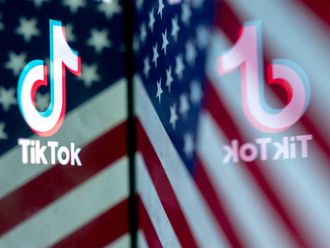Macdill Air Force Base: Florida The White House has distributed a list of 78 terrorist attacks to support President Donald Trump’s claim that the media is failing to properly report them.
Trump on Monday accused the media of deliberately minimising coverage of the threat posed by the Daesh group, saying news outlets “have their reasons” for not reporting what he described as a “genocide” underway at the hands of the group.
The president did not immediately offer evidence to support his claim, made during the new commander in chief’s first visit to the headquarters for US Central Command.
Later, the White House released a list of 78 attacks it described as “executed or inspired by” the Daesh group since September 2014. The White House said “most” on the list did not get sufficient media attention, although it did not explain how it defined the term. Some of the incidents on the list received widespread attention and deep reporting.
“You’ve seen what happened in Paris and Nice. All over Europe it’s happening. It’s gotten to a point where it’s not even being reported,” Trump told a group of military leaders and troops during the visit. “And in many cases, the very, very dishonest press doesn’t want to report it. They have their reasons and you understand that.”
Trump, who has made relentless criticism of the media a hallmark of his presidency, did not explain why he thinks news outlets minimise attention on such attacks.
But the list includes many atrocities that received blanket western media coverage including the Paris Bataclan attacks, the Nice truck killings and the San Bernardino shootings, the Guardian reported.
Many others including the Sydney siege and Germany’s Christmas market attack received wide international coverage.
The document also includes spelling mistakes such as “attaker” instead of “attacker” and “Denmakr” instead of “Denmark”.
There have been similar errors in official communications in recent days, including references to Theresa May as “Teresa” and a reference to Malcolm Turnbull as the “president” of Australia when it should be “prime minister”.
Lindsay Walters, a White House spokesperson, told the Guardian that the list demonstrates how terrorist attacks are losing perceived news value because of their frequency. “The real point here is that these terrorists attacks are so pervasive at this point that they do not spark the wall-to-wall coverage they once did,” she said via email.
“If you look back just a few years ago, any one of these attacks would have been ubiquitous in every news outlet, and now they’re happening so often — at a rate of more than once every two weeks, according to the list — that networks are not devoting to each of them the same level of coverage they once did.
“This cannot be allowed to become the ‘new normal’, and the President, for one, is not going to be satisfied until the American people are much safer and more secure.”
Earlier, Spicer told reporters travelling on Air Force One that Trump believes attacks are not “unreported” but “underreported.”
He said: “He felt members of the media don’t always cover some of those events to the extent that other events might get covered.”
But David Gergen, a political analyst and former adviser to four US presidents, condemned Trump’s remarks.
“I think this is one of the most outrageous claims the president has made, among many, because it really says, basically, that the press is not doing its job because it has its own political agenda,” he told CNN. “It doesn’t want you to know the truth about how dangerous terrorism is. It doesn’t want to be out there, it’s just pulling a leftist agenda on you, which is clearly not true.”
Gergen added: “He engages in these falsehoods without producing any serious evidence. The list includes San Bernardino, as if the press didn’t cover that sufficiently. It’s just astonishing and it’s beneath the dignity of the presidency and I think it tears at the fabric of what holds us together as a people when we can’t trust each other, we can’t trust the White House, and he’s telling us we can’t trust the press. This is the way democracies come unravelled.”
Trump also touched upon various alliances in his remarks, noting, “we strongly support Nato.”
He spoke on Sunday with Nato Secretary General Jens Stoltenberg. A White House statement said the two “discussed how to encourage all Nato allies to meet their defence spending commitments,” and also talked about the crisis in Ukraine and security challenges facing Nato countries.
Trump once dismissed the trans-Atlantic military alliance as “obsolete,” and said he would decide whether to protect Nato countries against Russian aggression based on whether those countries “have fulfilled their obligations to us.”
Speaking as commander in chief, Trump repeated his promises to defeat “radical Islamic terrorists” but provided no specifics on any policy changes he wants in the fight against Daesh.
Before his remarks, Trump sat down for lunch with a room full of troops in fatigues from the Army, Navy, Air Force and Marines, as well as senior members of his White House staff.
Trump made small talk with some of the soldiers, discussing everything from football to military careers.
“Gonna make it a career?” Trump asked one person.
“C’mon, you have to stay,” he urged another.












